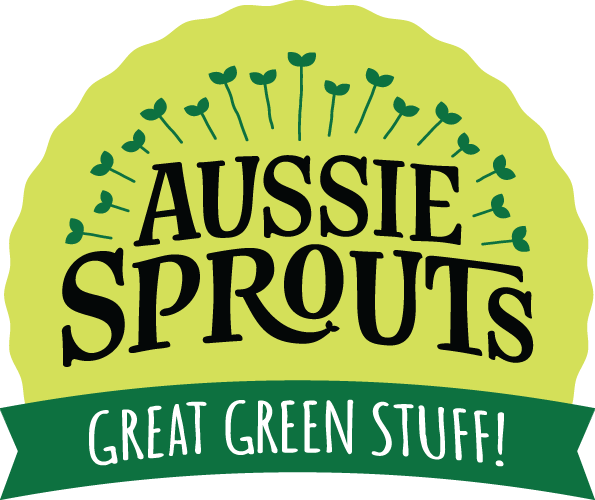WHERE TO BUY
Aussie Sprouts are sold at Coles and Woolworths. Due to the short shelf life of the product, we supply only the East Coast of Australia, South Australia and the Northern Territory. Unfortunately, Aussie Sprouts is not available in Western Australia or Tasmania
WHY AUSSIE SPROUTS?
Sprouts are a rich source of vitamins & minerals and a healthy, tasty addition to salads, stir-fry and sandwiches.
Crunchy Combo
The name says it all, the Crunchy Combo is a crunchy snack that is not only healthy, it’s tasty! Full of flavour and variety, the Crunchy Combo makes an excellent salad topper adding colour, texture and the all-important nutrients found only in sprouts.
The Crunchy Combo is versatile and provides an excellent alternative to seeds and nuts for those with allergies, and the good news is, you still get that oh-so satisfying crunch! Health conscious snackers can rejoice over this product as it is naturally grown and packaged at optimum freshness.
Consider adding the crunchy combo to sandwiches, wraps, salads and even soups, or get more adventurous and try our Crunchy Combo Falafel and Hummus recipe. This tasty selection of sprouts delivers all the flavour and nutrients you expect from sprouts plus more!
Grown in a chemical-free environment, all Aussie Sprouts products are grown with water and sunshine so there are no nasties involved in the growing, cleaning or packaging processes. Simply open and enjoy!
See our satisfying Crunchy Combo recipes here:
Benefits of Mung Bean Sprouts
VITAMIN K
Bacteria in the large intestine make some vitamin K, but not enough to meet your daily needs, according to the Linus Pauling Institute. Mung bean sprouts are a good source of vitamin K, with 1 cup of raw sprouts containing 34 micrograms, which means men get 28 percent of their recommended daily intake, while women gain 37 percent. Vitamin K is essential for the process of blood clotting. It also regulates bone mineralization and helps maintain bone density. A vitamin-K-dependent protein inhibits the build-up of calcium in blood vessels, which lowers the risk of cardiovascular disease, according to research published in the June 2009 issue of the “American Journal of Clinical Nutrition.”
VITAMIN C
Vitamin C’s antioxidant abilities protect cells from free radicals. Some free radicals develop as a byproduct of biochemical processes. Others form in response to cellular stress from a variety of sources, such as sunlight, lack of sleep, and cigarette smoke. If free radicals are not neutralized by an antioxidant, they attach to healthy cells, causing damage and inflammation that leads to chronic diseases. Vitamin C is also a component of the connective tissue collagen, which supports and strengthens skin, cartilage, and organs. One cup of raw mung bean sprouts delivers 14 milligrams of vitamin C. The Institute of Medicine recommends that men consume 90 milligrams of vitamin c daily, while women should get 75 milligrams. Anyone who smokes should add another 35 milligrams to those recommendations.
IRON
About 90 percent of the iron in your body is retained and reused, but you still need to consume enough to make up for the amount that’s normally excreted from the body every day. For men, that means getting 8 milligrams of iron in their daily diet, but women need 18 milligrams. In addition to carrying oxygen through the blood, iron supports your immune system by facilitating the growth of cells that regulate the immune response and attack infected cells. Men gain 12 percent and women get 5 percent of the recommended daily intake from 1 cup of raw mung bean sprouts.
FOLATE
Folate is a B vitamin that’s critical for creating DNA, producing and maintaining new cells, and making healthy red blood cells. These functions make it an essential vitamin for everyone, but it’s especially important to support periods of growth from conception through adolescence. Women need to have sufficient folate because it prevents birth defects of the brain and spinal cord that occur in the first 28 days of pregnancy. You’ll gain 16 percent of the recommended daily intake from 1 cup of raw mung beans.
Benefits of Lentil Sprouts
Lentils contain phytic acid, which can be difficult to digest. Sprouting neutralizes the phytic acid, which means more vitamins and minerals can be absorbed by your body as they’re digested.
When you sprout lentils, you’re actually starting the germination process, which changes the composition of the lentils. Sprouting increases the amounts of vitamins and minerals in the lentils, especially B vitamins and carotene.
Sprouting produces Vitamin C.
Like many legumes, lentils have sugars that create intestinal gas. Sprouting helps break down some of those sugars.
Benefits of Chickpea Sprouts
CALORIES
In a single serving of sprouted chickpeas, you consume approximately 160 calories — 8 percent of the daily recommended intake, or DRI, of 2,000 calories. At 160 calories per serving, sprouted chickpeas are relatively diet-friendly. To include sprouted chickpeas in your diet at a lower calorie cost, halve or quarter the serving size and enjoy them as a garnish rather than the focus of a meal.
CARBOHYDRATES & FIBRE
Sprouted chickpeas are rich in carbohydrates and dietary fibre, both of which will prolong the sensation of fullness after a meal. One serving contains around 24 grams of carbohydrates, which is 11 percent of an average 225-gram DRI. It also contains 3 grams of dietary fibre or 11 percent of a 28-gram DRI. Eating the DRI of dietary fibre keeps your digestive tract healthy, promotes heart health, and helps prevent constipation.
PROTEIN & FAT
A primary benefit of consuming sprouted chickpeas is their high protein content and low level of fat. This makes them an ideal meat replacement for vegetarians and individuals looking to make their diets healthier. In one serving of sprouted chickpeas, you consume 10 grams of protein or 20 percent of an average 50-gram DRI. The fat content is just 4 grams, equaling 3 percent of a healthy DRI. Only 1 gram of the fat in a serving of sprouted chickpeas is saturated.
VITAMINS & MINERALS
Sprouted chickpeas are rich in vitamins and minerals, providing a substantial amount of nutrients with each serving. One serving of sprouted chickpeas contains 105 milligrams of calcium, 115 milligrams of magnesium, 366 milligrams of phosphorus, 875 milligrams of potassium, 557 micro milligrams of folate and 67 international units of vitamin A. It also contains trace amounts of iron, sodium, vitamin C, thiamin, niacin, vitamin B-6 and vitamin K. Boiling the sprouted chickpeas will leach some of the nutrients into the water, reducing their nutritional value. For the best nutrient preservation, steam them.




